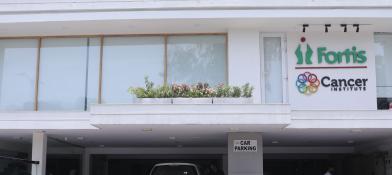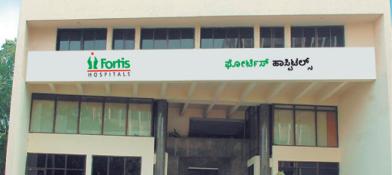Colectomy
What is a colectomy?
Being diagnosed with an ailment of the colon (also known as the bowel or large intestine) can be scary. One of the treatment methods - colectomy is explained below:
This is surgery to take out the diseased or damaged portion of the colon. Healthcare providers might suggest a colectomy to treat: Diverticulitis (Pouches in the wall of the colon become infected), Cancer as well as Inflammatory bowel disease (for instance: ulcerative colitis or Crohn’s disease).
A colectomy can be conducted in two modes:
Open colectomy: The surgeon makes an extended, vertical cut (incision) on the individual’s belly (abdomen).
Laparoscopic-assisted colectomy: The surgeon makes several minor cuts in the skin over the individual’s belly. Then, they put a minuscule video camera into one of the cuts to peep inside the individual’s body. They utilize long, thin tools put into the other cuts to perform the surgery. Individuals often have less pain and recover quickly because of the minor cuts.
Need of a colectomy
The individual might require a colostomy for a short duration to let the colon heal post-surgery. A few months later, the individual will undergo a second surgery to reconnect the bowel. However, based on the diagnosis, the colostomy may be permanent.
When an individual undergoes a colectomy to treat cancer, the surgeon excises the portion of the colon that has cancer in it. They also remove a small portion of the colon on either side of the tumour. They may also excise nearby lymph nodes to look for cancer.
Risks of a colectomy
Many individuals feel scared or anxious prior to surgery. These feelings are normal. Few predominant risks for a colectomy are:
- Reactions to anaesthesia
- Pneumonia
- Blood clots in the legs or lungs
- Internal bleeding
- Infection at the cut or inside the belly
- Hernia
- Scar tissue (adhesions) in the tummy, which can block the intestines.
- Leaking where the intestines are sewn together.
- Damage to surrounding organs.
How to get ready for a colectomy?
- Prior to a colectomy, healthcare team will do tests to learn more about specific bowel disease or cancer. These tests are required to plan surgery. They may comprise X-rays, scans, blood tests, an electrocardiogram (ECG), as well as a colonoscopy.
- A colonoscopy permits the surgeon to peep inside colon and rectum. It’s performed with a flexible, tubelike scope that has a tiny light as well as video camera on the end.
Healthcare provider will most likely tell individual to prepare with the following:
- Bowel prep: Individual’s bowels must be empty prior to the surgery. Individual will need to change what you eat and drink for a few days prior to surgery. Individual may need to do bowel prep one to two days prior to surgery, too. This may comprise a laxative and enemas to clean out bowels.
- Fasting for surgery: Individual should follow any instructions given about not eating or drinking prior to surgery.
- Stopping certain medications: Few medicines, like blood thinners, may need to be stopped in the week before the surgery. Individual should tell healthcare provider about all the medications he/she takes. That comprises prescription as well as over-the-counter medications, vitamins, herbs, supplements, marijuana, and street drugs.
- Preventing infection: The individual may be asked to shower with a special soap prior to surgery and might also be given antibiotics to aid prevent infection.
Any advice and rules from a healthcare provider will aid individual have a successful surgery as well as recovery. Ask questions about anything he/she doesn't understand. Take notes and record visits with healthcare provider to aid remember all their instructions.
What happens during a colectomy?
Here is what one can expect during surgery:
Individual will be administered general anaesthesia for the surgery. These medicines make individual sleep as well as not feel pain during surgery. The healthcare team will connect the individuals to monitor vitals - breathing, heart rate, and blood pressure.
The skin on the belly of individual will be rigorously cleansed, as well as any hair present in that portion may be trimmed or shaved. For an open colectomy, the surgeon will make an extended cut (incision) on tummy. For a laparoscopic-assisted colectomy, several small cuts will be made.
The surgeon will excise the diseased portion of the individual's colon. The surgeon might stitch the two exposed ends of the colon together, or they may create an opening to the exterior of the body, known as a stoma.
If an individual is suffering from cancer, the surgeon may take out lymph nodes near it. Surgeons generally take out at least 12 of these lymph nodes. Once the surgery is accomplished, the surgeon will close the incision.
What happens after a colectomy?
Individual will wake up in the recovery room. Individual will stay there until individuals are completely awake, alert, as well as breathing well. Individual will be hooked up to machines that watch vital signs (like heart rate and blood pressure). Then individual go to a hospital room. Individual will likely be in the hospital for 3 to 7 days.
Individual will need to take pain medication for several days to control pain. Managing pain at this stage is important so that individual can cough, take deep breaths, as well as get out of bed a bit easier as he/she recovers. Individual may receive some liquids as colon commences to work again. Healthcare team will individually know when he/she can eat solid foods again.
Individual will require to follow a low-residue, low-fibre diet for a few weeks to decrease the quantity of stool passing through bowel as it heals. The medical professionals will schedule follow-up appointments to check on progress.
To summarise, a colectomy refers to a surgery done to remove all or portion of colon. Common reasons comprise colon cancer as well as inflammatory bowel diseases. A colectomy can be conducted in two ways Open colectomy as well as Laparoscopic-assisted colectomy. Colectomy is major surgery; it is largely safe as well as effective.
Popular Searches :
Hospitals: Cancer Hospital in Delhi | Best Heart Hospital in Delhi | Hospital in Amritsar | Hospital in Ludhiana | Hospitals in Mohali | Hospital in Faridabad | Hospitals in Gurgaon | Best Hospital in Jaipur | Hospitals in Greater Noida | Hospitals in Noida | Best Kidney Hospital in Kolkata | Best Hospital in Kolkata | Hospitals in Rajajinagar Bangalore | Hospitals in Richmond Road Bangalore | Hospitals in Nagarbhavi Bangalore | Hospital in Kalyan West | Hospitals in Mulund | Best Hospital in India | | Cardiology Hospital in India | Best Cancer Hospital in India | Best Cardiology Hospital in India | Best Oncology Hospital In India | Best Cancer Hospital in Delhi | Best Liver Transplant Hospital in India
Doctors: Dr. Rana Patir | Dr. Rajesh Benny | Dr. Rahul Bhargava | Dr. Jayant Arora | Dr. Anoop Misra | Dr. Manu Tiwari | Dr. Praveer Agarwal | Dr. Arup Ratan Dutta | Dr. Meenakshi Ahuja | Dr. Anoop Jhurani | Dr. Shivaji Basu | Dr. Subhash Jangid | Dr. Atul Mathur | Dr. Gurinder Bedi | Dr. Monika Wadhawan | Dr. Debasis Datta | Dr. Shrinivas Narayan | Dr. Praveen Gupta | Dr. Nitin Jha | Dr. Raghu Nagaraj | Dr. Ashok Seth | Dr. Sandeep Vaishya | Dr. Atul Mishra | Dr. Z S Meharwal | Dr. Ajay Bhalla | Dr. Atul Kumar Mittal | Dr. Arvind Kumar Khurana | Dr. Narayan Hulse | Dr. Samir Parikh | Dr. Amit Javed | Dr. Narayan Banerjee | Dr. Bimlesh Dhar Pandey | Dr. Arghya Chattopadhyay | Dr. G.R. Vijay Kumar | Dr Ashok Gupta | Dr. Gourdas Choudhuri | Dr. Sushrut Singh | Dr. N.C. Krishnamani | Dr. Atampreet Singh | Dr. Vivek Jawali | Dr. Sanjeev Gulati | Dr. Amite Pankaj Aggarwal | Dr. Ajay Kaul | Dr. Sunita Varma | Dr. Manoj Kumar Goel | Dr. R Muralidharan | Dr. Sushmita Roychowdhury | Dr. T.S. MAHANT | Dr. UDIPTA RAY | Dr. Aparna Jaswal | Dr. Ravul Jindal | Dr. Savyasachi Saxena | Dr. Ajay Kumar Kriplani | Dr. Nitesh Rohatgi | Dr. Anupam Jindal
Specialties: Heart Lung Transplant | Orthopedic | Cardiology Interventional | Obstetrics & Gynaecology | Onco Radiation | Neurosurgery | Interventional Cardiology | Gastroenterologist in Jaipur | Neuro Physician | Gynecologist in Kolkata | Best Neurologist in India | Liver Transfer | Best Cardiologist in Delhi































